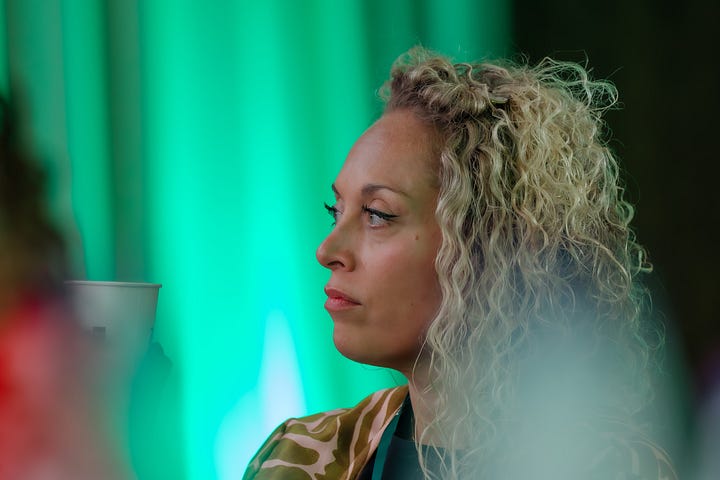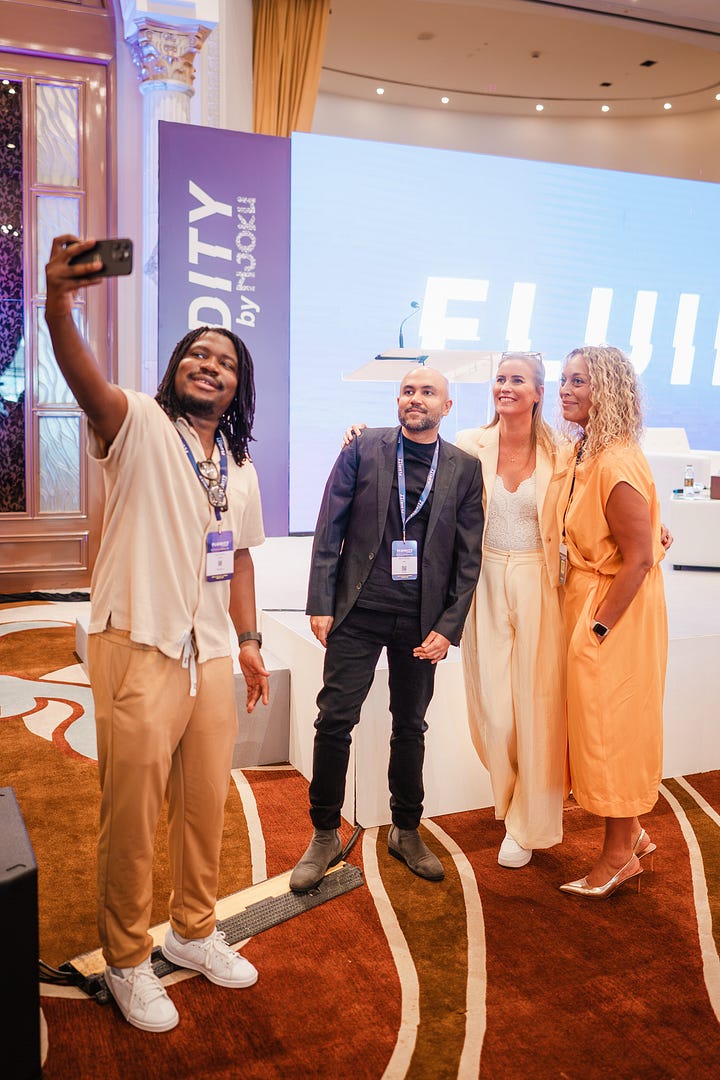Offscript with Jessica Hope
The CEO and founder of Wimbart shares how hard work and community helped her build Africa’s foremost tech PR agency.
“I have huge respect for where I came from and our immigrant mentality of how we work. When you’re an immigrant in a country, you usually have to work five times harder than everybody else. That’s what Wimbart represents: we’re unapologetically intense, put in a lot of effort, and get great results.”
If you had told Jessica Hope twenty years ago that she would one day run a public relations agency shaping how the world views Africa’s tech industry, she probably would have laughed and returned to her daydreams about travel. But that’s her life now. As founder and CEO of Wimbart, Hope leads one of the most respected PR agencies in Africa’s start-up ecosystem.
And if you ask her how she got here, she’ll tell you: by working hard, staying adaptable, and leaning on her community.
Hope grew up between London and Devon: half city, half countryside. Her father’s family came from Guyana in the Caribbean, and her grandparents built a life together in 1950s Britain. The street where they lived, Wimbart Road in South London, would one day lend its name to her company.
“I was a geeky, nerdy kid,” she says, laughing. “I played chess, loved reading, but also liked to party a bit. I was really lucky. I had great friends and very supportive parents.”
Her father, a trailblazer in the British police force, modelled ambition and discipline early. He rose to become the youngest inspector, the first Black chief inspector, and later a borough commander. “He worked incredibly hard,” she says. “So did my grandparents. I was brought up to understand that you have to work very hard, whatever you do.”
By age thirteen, Hope was already juggling jobs. Saturdays in a bakery, paper rounds on Friday nights, waitressing during weekends and holidays. “I worked all year round so I could travel,” she recalls. “I loved travelling. I used to travel a lot with my dad when I was much younger, and from sixteen, I started travelling on my own.”
Those early adventures, travelling across Europe, built her confidence and curiosity. When she enrolled at the University of Manchester to study History and French, later adding a master’s in Religion and Political Life, she already knew she was drawn to storytelling. “I always wanted to be a journalist,” she says. “I liked researching and writing. I think I had a flair for it.”
Hope started out writing for university publications. After graduation, she worked at two Manchester magazines, one of them with a young entrepreneur named Jason Njoku. Together, they tried to launch a lifestyle magazine for young professionals, but advertising revenue never came through. “It just didn’t make money. We were young, experimenting, and print was expensive.”
After the second magazine folded, reality set in. “I’d worked for two publications in Manchester, neither of which worked out financially. So at that stage, I thought, ‘I need to get serious.’”
That seriousness led her to her first PR job at a Manchester agency. The transition made sense; the skills she had developed as a journalist, including writing, research, and understanding audiences, overlapped with the requirements for PR. But the pace and professionalism were new. “It taught me how to deal with clients, how offices really worked. I learned quickly because my bosses were amazing, and I worked really hard.”
She grew within the company and got promoted, but she became restless. When she got a job offer in London, she tendered her resignation. Her employers matched the offer, but after spending seven years in Manchester, she knew it was time to move on.
Her next chapter led her to a government press office specialising in the construction industry. It was stable and well-structured work, but she missed the creativity. “I’d always wanted to work in the arts. I’m a history student — I’ve always wanted to work in museums,” she says.
She first moved to a sister government agency focused on the arts, but she was made redundant after three months. One day, while browsing on Gumtree for a bar job, she stumbled on a posting for the Natural History Museum’s press office. She applied on her birthday and started two days later. “It was amazing,” she recalls. “Fast-paced, one day you’re doing consumer PR, the next day it’s science PR.”
That short contract led to a role as Head of Press at the Jewish Museum in London, where she stayed for nine months.
Then Jason Njoku came calling again. At the time, he had just raised $3 million for his new company, iROKO, which was helping to bring Nollywood films online. And he wanted Hope to handle the company’s communications.
Joining iROKO meant diving into the heart of Africa’s emerging tech scene. Hope helped open the company’s New York office and handled everything from corporate communications to celebrity partnerships. The work was chaotic but thrilling. It taught her how to manage complexity, build systems from scratch, and communicate across continents.
Hope’s work with iROKO made her popular in the African startup scene, and other founders who had seen iROKO’s success wanted her to work with them. She recognised the opportunity and, in 2016, with a three-month-old baby and her father helping with admin, she launched Wimbart — named after the street where her family’s story began.




Wimbart started as a one-woman operation. Soon, Hope hired Maria, a former colleague from iROKO. Together, they worked from home, managing a handful of clients. Every hire was a careful decision. The company grew organically, with no investors, no big office, and just word of mouth and results.
Their early clients included Ringier, Silvertree Capital, and iROKO itself. But the turning point came when they secured Andela. The deal took over a year to close, but it transformed Wimbart from a small boutique into a serious agency. Over the next several years, Wimbart would go on to work with Kobo360, Paystack, 54gene, and PiggyVest, among others.
Hope saw her role as more than just securing press. In the early days, she often had to educate international journalists about Africa’s tech scene. “In the early days, international journalists wanted rags-to-riches stories,” she says. “We had to help them understand that there’s a middle class, a sophisticated market, and real innovation here.”
Nearly a decade later, Wimbart has worked with more than 160 companies. Hope’s leadership has evolved with the business. In the early years, she handled everything herself, including writing press releases, fielding media calls, and managing clients. Now, she focuses on strategy, growth, and mentoring her team. “For a long time, I was working in the company, writing press releases, sitting on client calls, instead of on the company. Now, I’m focused on strategy, growth, and direction.”
As Wimbart approaches its tenth anniversary, Hope is thinking about the future. The company is expanding its scope beyond traditional PR into strategic consultancy, advisory, and network building.
Hope often describes Wimbart as a product of the values she inherited: resilience, discipline, and an unshakeable belief in hard work. “When you’re an immigrant in a country,” she says, “you learn to work five times harder than everyone else.”
That spirit, passed down through generations, is now enshrined in company culture and continues to define both her and Wimbart.





I’ve engaged with Jessica in the past when I led comms at AVCA. I didn’t know much about the Wimbart backstory so this was an enjoyable read for me. It’s great to read stories about years and years of putting the work in (no substitute for hard work, really). Such a useful piece for the agency founders of today. Thanks for sharing ❤️